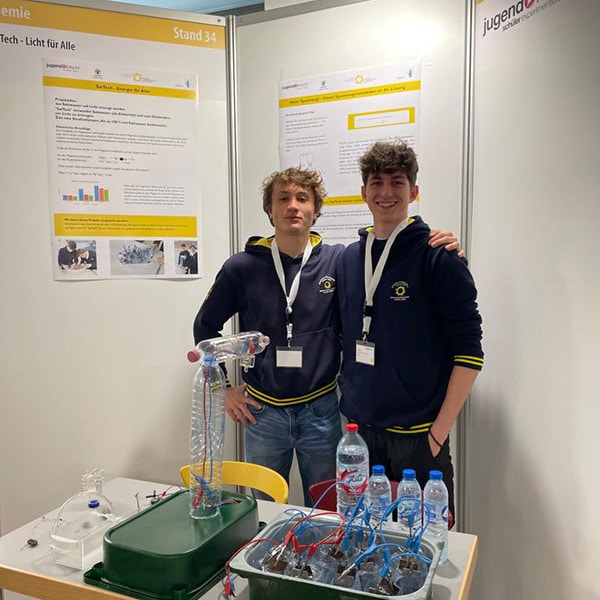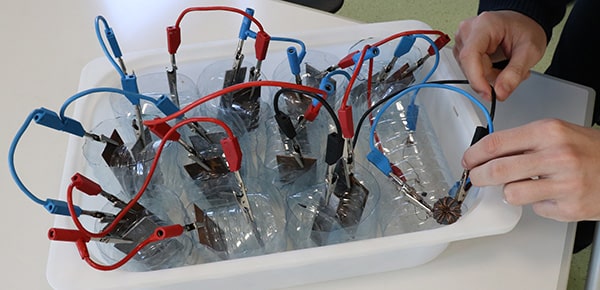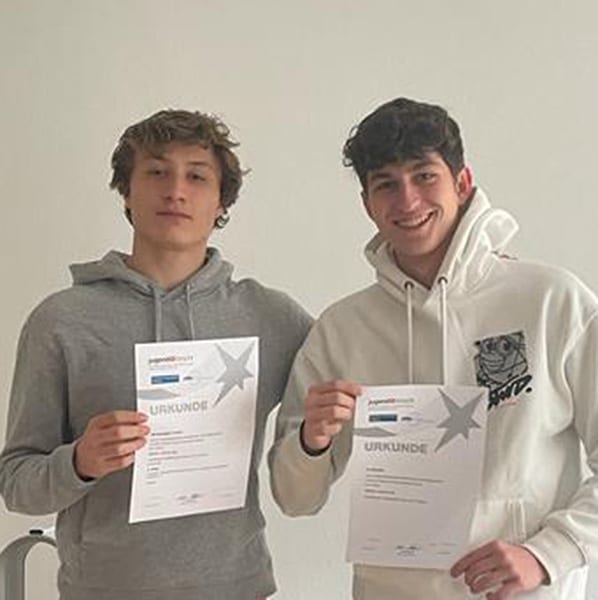Successful young scientists
February 24, 2023

The light comes on at the push of a button - completely normal for us. "Millions of people don't have this luxury. Our project "SalTech - Light for All" aims to change that," explain Ty Stevens and Michelangelo Foschi, who took 3rd place in the chemistry section of this year's regional "Jugend forscht" competition in Thuringia with their special idea of powering street lamps with salt water.
Influenced by their oceanfront home in Dubai , the project idea SalTech, which generates light from salt water, was born. "Our goal is to have a street lamp that works 100% with salt water," Ty Stevens explains. The chemical basis of the project is a galvanic element made of magnesium and copper. A magnesium electrode and copper electrode are placed in the electrolytic medium of salt water. During the chemical reaction, an electrochemical cell is formed. "This leads to electrical charge separation and the formation of an electrical potential between the two half-cells," the junior researchers explain. "Through a Joule-Thief circuit developed in a long series of experiments, the resulting DC voltage is transformed into a higher electrical voltage."
Our goal is a street lamp that works 100% with salt water
Michelangelo Foschi and Ty Stevens ,11a
A total of 112 student*innen from 15 schools and student research centers from Central Thuringia took part in the regional "Jugend forscht" competition plus our two student as the only representatives of a German school abroad. The 3rd place great success, which rewards the months of very intensive work of the two student from the 11a. "Other participants* have worked on their projects for more than two years, so our third place is to be particularly highly valued," explains DISD chemistry teacher Sara Karwounopoulos with satisfaction, who has been supervising her protégés since October 2022. Many lunch breaks were worked through to finalize the project.
The work paid off, because in addition to 3rd place, SalTech also received the special "JugendUnternimmt summer school" award, which means an invitation to the STIFT (Stiftung für Technologie, Innovation und Forschung Thüringen) summer camp for the inventors. Here, Ty Stevens and Michelangelo Foschi will be able to take part in special chemistry workshops next summer.
The team from Dubai received great admiration at its SalTech presentation stand. "We received a lot of positive feedback. There were also skeptics, but in the end our project was very well received. The exchange with other participants was very interesting to learn what initiatives exist in German schools and how we as teachers can support our young scientists," says Sara Karwounopoulos. The DISD-student were also happy to have interesting meetings with experienced chemistry teachers, but also participants* who attend science-focused schools. "It was impressive and inspiring to see the high-tech equipment of the other projects," saidTy Stevens. The young scientists already have ideas for further developing the SalTech project. For example, they would like to make a simple circuit from everyday parts for developing countries. "We are still experimenting with which electrodes are most suitable and what properties the solution and the structure should have in order to create an efficient circuit," explains Michelangelo Foschi.
The two young scientists would also like to present their SalTech project in Dubai and the region. "We are currently looking for competitions to continue with the SalTech idea," says Michelangelo Foschi.
The two young scientists have big visions for the dissemination of their product. They want to visit small villages in South America and Africa to present and implement the SalTech project. "Many villages in developing countries cannot afford them modern, sustainable energy technologies and access to a stable power supply is not available. That's why our invention is important. It will help improve the quality of life in these low-resource villages and introduce the concept of sustainability."
A total of more than 5,000 projects from the fields of technology, earth and space sciences, physics, chemistry, math/computer science, biology and the world of work were submitted for the "Jugend forscht" competition. Just under 1,600 were submitted in the field of chemistry.
Further information on the "Jugend forscht" competition

